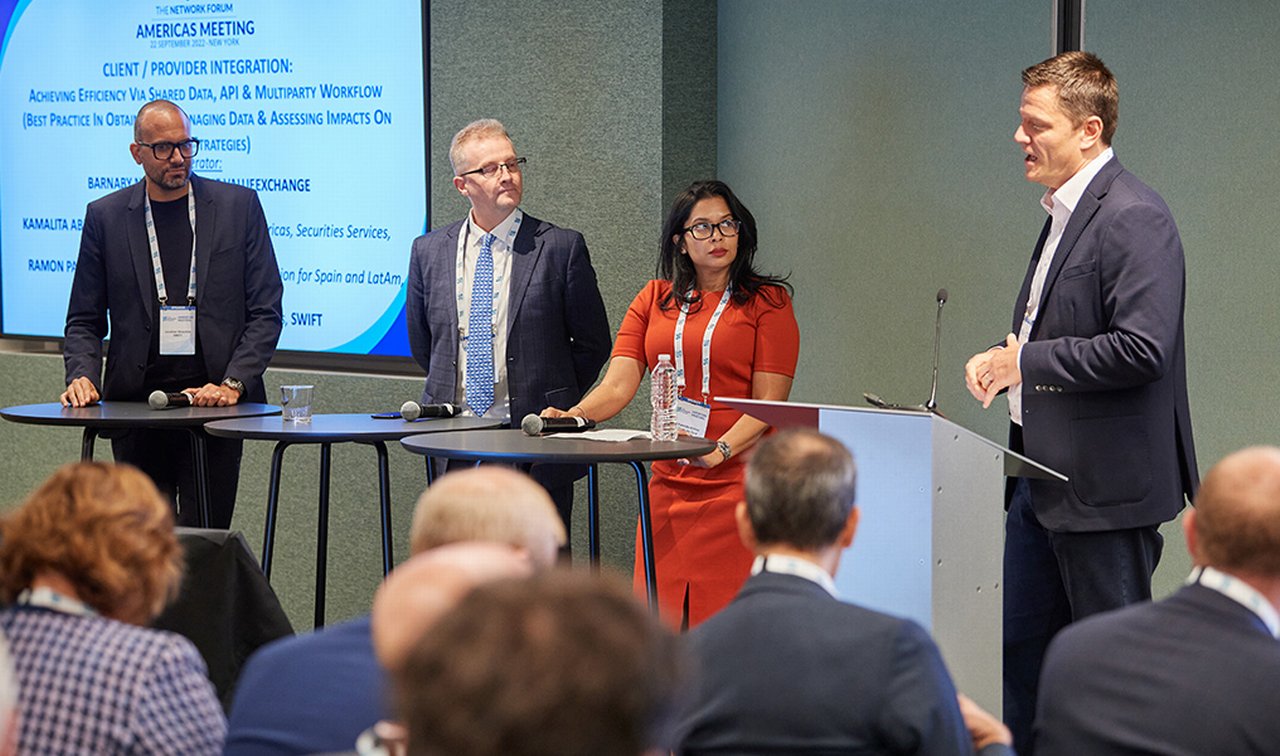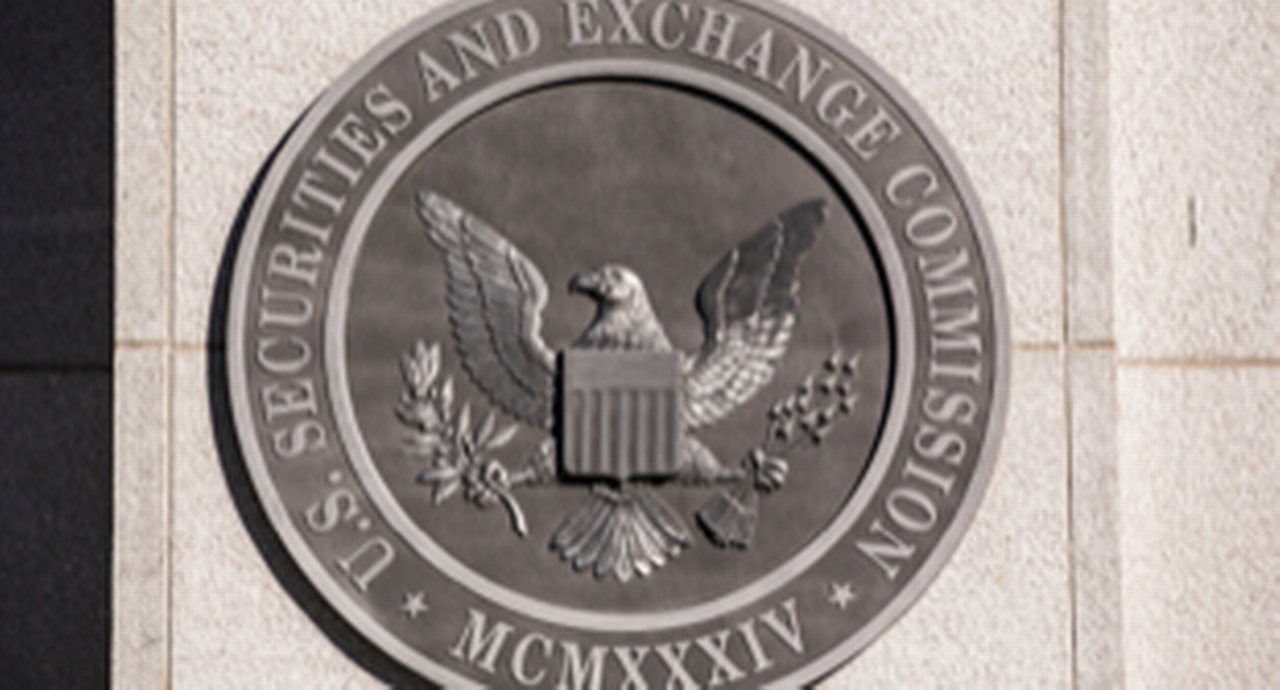28 October 2022
The Network Forum (TNF) returned to New York for its Americas Meeting on 22 September, where leading experts from across the securities services industry discussed settlement compression, macro-economic challenges and digital asset readiness. flow reports
MINUTES min read
With the The Network Forum (TNF) in London having taken place mid-June 2022 after a three-year pandemic-enforced hiatus, it was America’s turn to re-open its TNF doors and bring the community together in person again. More than 100 network managers, direct custody providers, central securities depositories (CSDs) and tech innovators from across the region made their way to New York City.
While TNF delegates discussed settlement compression and the impact of the Russia/Ukraine crisis1 (to name two themes), the ‘High-Level Week’ of the 77th Session of the United Nations General Assembly2 had got underway elsewhere in the city three days earlier – tasked with addressing heightened geopolitical tension.
Digital asset capability investment
One popular session was Seamus Donoghue’s (Metaco) ‘Digital Assets & Custody in the spotlight’ session that walked delegates through the range of financial and non-financial digital assets, explaining that financial institutions are “well placed” to unlock the opportunity – a point made by Deutsche Bank’s Boon-Hiong Chan in his white paper, The triple revolution in securities post-trade. “The largest Tier 1 custodians invest in the infrastructure to safeguard the market, triggering a virtuous cycle of adoption. The shift creates new regulatory standards, and banks are setting up the gold standard of compliance practices,” he declared.
In particular, the securities services industry is investing heavily into application programming interfaces (APIs) as it looks to both streamline and enhance client connectivity. Kamalita Abdool, Managing Director, Head of Americas, Securities Services at Deutsche Bank, says APIs will help root out many of the manual activities in traditional custody operations, thereby improving overall client service and generating efficiencies.
However, there are some lingering issues facing APIs. A recurrent criticism within the industry is that there is no standardisation of APIs (in terms of their data formats and structure, etc.). This runs the risk of creating market fragmentation, as it will be difficult for different API systems to interoperate with each other. For example, an asset manager with dozens of custodial relationships might have to run multiple – and different – API communication channels with each and every one of their providers, resulting in a spaghetti junction of API systems.
“APIs must be about delivering true value to the end customer”
Even standardisation, however, is not without challenges, not least because it could impede innovation if executed badly. Abdool believes a delicate balance needs to be struck between creating industry-wide standards for APIs and ensuring that an element of customisation is still available for some clients. “APIs must be about delivering true value to the end customer. While there needs to be more robust governance around APIs and the data, there also needs to be some agility and flexibility as well. If we do not allow for bilateral APIs to continue, then the industry is at serious risk of stifling innovation,” she reflects.

Speakers at the session, ‘Client/Provider Integration – Achieving efficiency via shared data, API and multiparty workflow (best practice in obtaining and managing data and assessing impacts on business strategies)
Left to right: Jonathan Ehrenfeld (SWIFT); Ramon Parrilla (Caceis); Kamalita Abdool (Deutsche Bank). Moderator (right): Barnaby Nelson – the ValueExchange
Further settlement compression?
In April 2022, flow reported on the arrival of T+1 securities settlement in America following the Securities and Exchange Commission’s proposal for rule changes to “shorten the standard settlement cycle for most broker-dealer transactions in securities from two business days after the trade date (T+2) to one business day after the trade date (T+1). The changes are “designed to reduce the credit, market, and liquidity risks in securities transactions faced by market participants and US investors”.3
North America’s pivot away from T+2 and towards a T+1 settlement cycle featured in the intriguingly entitled morning session, ‘T+1: what the shift means for T+0 settlement cycles and leveraging DLT – is this a pied piper moment?’. Proponents of settlement compression argue it will reduce counterparty and settlement risk, allowing for market participants to post less margin on trades, enabling for better capital optimisation.
While T+1 could unlock a number of strategic benefits, there are some potential pitfalls. Institutions located in time zones outside the US could find it difficult to manage their FX transactions, forcing certain firms to pre-fund some of their trades. Additionally, others are warning that adopting T+1 risks increasing the number of trade settlement fails.
Although T+1 is not expected to go live until March 2024, experts are already discussing what comes next, with some pushing hard for a speedy implementation of T+0 or end-of-day settlement, which proponents argue can be achieved using existing technology.
Further reductions of the settlement cycle will not, comment sceptics, yield that many advantages, but could instead saddle impacted organisations with additional risks. According to the Securities Industry and Financial Markets Association (SIFMA), T+0 could disadvantage smaller institutions who are unable to make the necessary investments into their systems to cope with the reduced settlement timeframes. SIFMA also notes that the number of trade fails could jump exponentially under T+0, as it would be harder to repair fails during such a limited time-window.4
Nonetheless, new technologies such a distributed ledger technology (DLT), smart contracts and digital assets could help the industry transition to a T+0 or even atomic settlement cycle more seamlessly. “I believe the ultimate end goal for the industry will be to design all near-term technology changes to enable T+0,” says Abdool.
Network managers – back to normality, but new challenges emerge
Network management teams have found themselves dealing with not one, but two black swan events over the last three years, namely Covid-19 and the Russia/Ukraine conflict. In the case of the latter, sanctions have forced sub-custodians to either exit the market or freeze Russian assets.
“Recent events have highlighted how important it is for network management teams to continuously monitor their sub-custodian providers and have access to timely information and risk data. Network managers are certainly increasing their oversight of providers through more monitoring and better use of technology,” according to Ana Giraldo, Director for the Americas and Eurasia at Thomas Murray Data Services.
Due diligence processes have also undergone extensive changes since the pandemic. In addition to focusing on new areas to watch – such as cyber-security, business continuity planning, digital assets and environment, social and governance (ESG) framework compliance – network teams are once again starting to visit markets in their networks, after a two-year gap.
While it is irrefutable that in-person meetings with local market infrastructures and regulators are more constructive and better from an intelligence-gathering perspective, virtual tools do, agreed delegates, have a vital role to play. “Due diligence on network managers has been transformed irrevocably since the pandemic. Although on-sites are likely to return in greater numbers as more people return to offices, I imagine tools such as Zoom will continue to be used widely, especially as budgets face downward pressure,” says Abdool.
The evolving network manager
Securities markets are rapidly evolving. In the Americas, principally the US and Canada, the shortening of the trade settlement cycle will have a substantial impact well beyond their respective borders. At the same time, digitalisation is completely transforming how securities markets function, while the traditional role of the network manager is continuously evolving too. “With financial markets going through a period of volatility and change, clients need to work with sophisticated sub-custodians to support them in navigating through these complexities,” concludes Abdool.
The Network Form Americas Meeting was held 22 September 2022 in New York, USA
Securities services solutions Explore more
Find out more about our Securities services solutions
Stay up-to-date with
Sign-up flow newsbites
Choose your preferred banking topics and we will send you updated emails based on your selection
Sign-up Sign-upSubscribe Subscribe to our magazine
flow magazine is published annually and can be read online and delivered to your door in print
You might be interested in
SECURITIES SERVICES
T+1 settlement reaches America T+1 settlement reaches America
The US has announced a reduction of the securities settlement cycle from T+2 to T+1, following a relatively trouble-free transition from T+3 to T+2 five years ago. flow reports on the risks and benefits of this next step, market responses and what it could mean for atomic (immediate) settlement
CORPORATE BANK SOLUTIONS
The triple revolution in securities post-trade The triple revolution in securities post-trade
Digital assets custodial capabilities are under scrutiny and digital ecosystems such as decentralised finance (DeFi) and stablecoins in the cryptocurrency space have expanded the post-trade possibilities. Our new flow special white paper explains the implications for post-trade securities services
SECURITIES SERVICES {icon-book}
Settlement compression – where next? Settlement compression – where next?
Now that India, the US and Canada have confirmed they are reducing trade settlement cycles from T+2 to T+1, what are the risks and what are the benefits? flow takes a closer look at accelerated settlement



